
As its ‘last samurai' chief battles poor health, frontmen from factions in Malaysia's Islamist party PAS are touted as successor
With reports of the party chief’s frail condition, transition talks are simmering. Potential successors from different factions in the party include Mr Abdul Hadi’s eldest son Dr Muhammad Khalil, and progressive professional Dr Ahmad Samsuri.
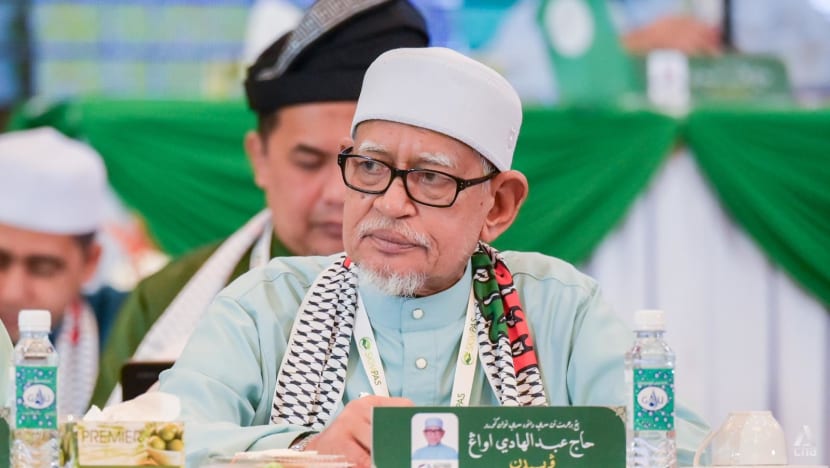
Parti Islam Se-Malaysia (PAS) president Abdul Hadi Awang at the party's 69th annual congress in Shah Alam, Selangor on Oct 21, 2023. (Photo: CNA/Fadza Ishak)
KUALA TERENGGANU: Reports of Parti Islam Se-Malaysia (PAS) president Abdul Hadi Awang’s continuing ill health have triggered speculation over a potential successor for the top position of Malaysia’s Islamist party.
Two political rising stars from different factions of the party have emerged as main contenders to succeed the 76-year-old: one a religious legacy candidate, the other a progressive professional.
The differences between Mr Abdul Hadi's son Dr Muhammad Khalil, and Dr Ahmad Samsuri, as well as their contrasting ideologies representative of the respective camps, have caught the attention of observers and raised questions over the future direction of the party, and whether any potential infighting could disrupt a smooth transition.
Political analysts CNA spoke to believe that it could soon be time for PAS to consider succession. And as the party enjoys its strongest position yet, following a stellar performance in 2023 state elections and looks to attract new voter demographics, the stakes are high for whoever might step up to take the helm.
Associate Professor Yusri Ibrahim, chief researcher at think-tank Ilham Centre told CNA: “In the context of PAS with the concerns over health of the party president, it is perhaps time for the party to commence a leadership transition.
“The snag is that in PAS currently it is unclear who has the most calibre to take over the leadership mantle,” he added.
A CRITICAL POINT FOR SUCCESSION PLANNING
PAS is at a crucial juncture in its history.
The party is arguably at the strongest point since it was founded in the 1950s. It currently holds the most seats in the federal legislature after a strong showing in the 2022 general election, more than Prime Minister Anwar Ibrahim’s Parti Keadilan Rakyat (PKR) as well as the country's historically dominant party the United Malays National Organisation (UMNO).
However, PAS and its ally party Parti Pribumi Bersatu Malaysia (Bersatu) in the Perikatan Nasional (PN) coalition did not garner enough seats and support to form the government and are now in the opposition.
Researchers have predicted that PAS’ influence is expected to grow with the party strengthening its base in areas where Malay Muslims are the majority, while making inroads in urban areas, as seen during the 2023 state elections when it won 105 out of 127 seats it contested.
Speculation over who might lead the party through this era of potential growth has been further fuelled by recent reports of the current chief’s continuing ill health.
Two years ago, Mr Abdul Hadi was hospitalised at the National Heart Institute in Kuala Lumpur for shortness of breath.
More recently in July 2023, he was again warded in his home state Terengganu for an unspecified illness. At the time, his condition was of sufficient concern that Dr Muhammad Khalil released a statement asking for well-wishers to make prayers for his father's health.
Mr Hadi Awang was again hospitalised on New Year's Day for an unspecified illness at the National Heart Institute. He was reportedly discharged in February.
When the newly installed Sultan Ibrahim Sultan Iskandar delivered his maiden speech in the lower house at the end of February, the PAS president’s seat at the front of the opposition bench was conspicuously empty.
During the PN's elected lawmakers convention in Kuala Lumpur in early March, the current PAS chief was spotted in a wheelchair. Local media reported that the Marang Member of Parliament (MP) needed help to stand for certain segments of the programme, including a photo shoot.
POSSIBLE SUCCESSOR FROM PROFESSIONAL OR ULAMA FACTION?
Mr Abdul Hadi's eldest son, Dr Muhammad Khalil, is a member of the party’s central committee, a former youth chief, and a potential successor to his father's position.
Analysts noted that there is interest surrounding the 47-year-old given that he has been put forth by the party recently for important roles.
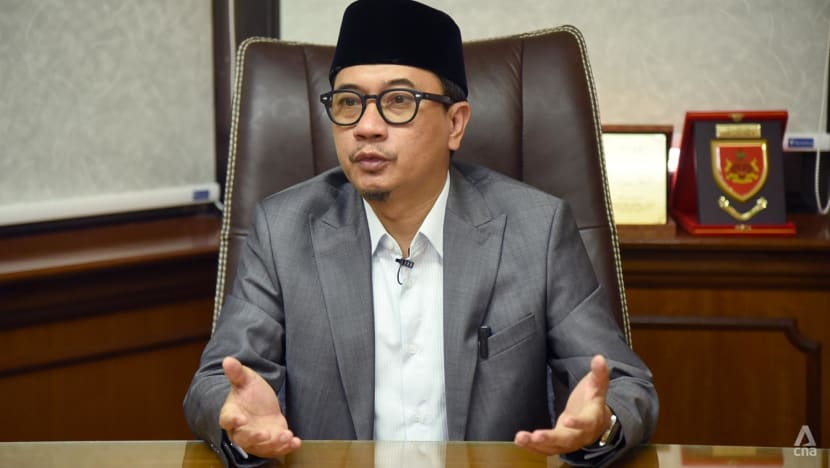
Muhammad Khalil Abdul Hadi speaks during an interview with CNA in Wisma Darul Iman, Kuala Terengganu. (Photo: CNA/Zamzahuri Abas)
The two-term state assemblyman is currently member of the Terengganu state executive council, chairing the committee for information, religious preaching and Syariah empowerment.
He has also been outspoken in issues pertaining to the party’s role in implementing Syariah, expressing disappointment at a recent apex court ruling that found the state of Kelantan had overreached in its Syariah law implementation.
This came after the Federal Court ruled on Feb 12 that Kelantan, governed by PAS, cannot expand the jurisdiction of its Syariah law to include criminal acts already covered by federal powers.
Dr Muhammad Khalil is an Islamic scholar, having completed religious studies in Yemen and the United Kingdom before obtaining a PhD at the local University Sultan Zainal Abidin.
“(Dr Muhammad Khalil) is being groomed … he is put to the fore and may be seen as the person at the forefront for the party,” said political analyst Norshahril Saat, senior fellow at ISEAS-Yusof Ishak Institute.
“But I’m not sure (where he stands) in the party ranks. Now because his father is there and is in charge, party members tend to give him a certain level of respect,” he added.
During an interview with CNA recently, Dr Muhammad Khalil was coy when asked if he had ambitions to succeed his father in the party’s top post.
“In PAS we have our own system. This is not a system based on family lineage, (leadership) has to be picked by party members at all levels of the party,” said the Batu Buruk state assemblyman.
“I am thankful because I was educated in a family and by my father to serve the people and spread religious Islamic knowledge from when I was a teenager,” he added.
Dr Muhammad Khalil said that he was ready to serve the party alongside the children of key PAS leaders, such as senator Nik Abduh, son of the party’s former spiritual leader Nik Abdul Aziz Nik Mat who died in 2015.
“I am not alone in this, there are many children of the older generation PAS leaders who are now involved in the party directly to continue the legacy of our parents,” he added.
Dr Muhammad Khalil is the eldest of Mr Abdul Hadi's 14 children. His seventh child - Mr Yusof Abdul Hadi - is the only other reportedly directly involved in PAS. Mr Yusof serves as a committee member for the Marang constituency.
Three of Mr Abdul Hadi's son-in-laws are also party members and have held positions at the constituency level, but not at the federal level or the party's central committee.
Observers also noted that in Malaysian politics, family lineage has played a part in developing the political careers for some children of big personalities.
Examples include former prime minister Najib Razak, who is son to Malaysia’s second premier Abdul Razak Hussein, former Democratic Action Party chief Lim Guan Eng who had taken over from his father Mr Lim Kit Siang, as well as the budding careers of Ms Nurul Izzah Anwar and Mr Mukhriz Mahathir, who are children to Mr Anwar and former premier Mahathir Mohamad respectively.
Another key PAS politician who has caught analysts’ attention as a possible candidate for the next party chief is Dr Ahmad Samsuri.
The PhD holder in aeroengine ignition and combustion, who was also an aerospace lecturer at University Putra Malaysia before joining politics, won a by-election in Kemaman federal constituency in November.
The two-term state assemblyman is currently member of the Terengganu state executive council, chairing the committee for information, religious preaching and Syariah empowerment.
He has also been outspoken in issues pertaining to the party’s role in implementing Syariah, expressing disappointment at a recent apex court ruling that found the state of Kelantan had overreached in its Syariah law implementation.
This came after the Federal Court ruled on Feb 12 that Kelantan, governed by PAS, cannot expand the jurisdiction of its Syariah law to include criminal acts already covered by federal powers.
Dr Muhammad Khalil is an Islamic scholar, having completed religious studies in Yemen and the United Kingdom before obtaining a PhD at the local University Sultan Zainal Abidin.
“(Dr Muhammad Khalil) is being groomed … he is put to the fore and may be seen as the person at the forefront for the party,” said political analyst Norshahril Saat, senior fellow at ISEAS-Yusof Ishak Institute.
“But I’m not sure (where he stands) in the party ranks. Now because his father is there and is in charge, party members tend to give him a certain level of respect,” he added.
During an interview with CNA recently, Dr Muhammad Khalil was coy when asked if he had ambitions to succeed his father in the party’s top post.
“In PAS we have our own system. This is not a system based on family lineage, (leadership) has to be picked by party members at all levels of the party,” said the Batu Buruk state assemblyman.
“I am thankful because I was educated in a family and by my father to serve the people and spread religious Islamic knowledge from when I was a teenager,” he added.
Dr Muhammad Khalil said that he was ready to serve the party alongside the children of key PAS leaders, such as senator Nik Abduh, son of the party’s former spiritual leader Nik Abdul Aziz Nik Mat who died in 2015.
“I am not alone in this, there are many children of the older generation PAS leaders who are now involved in the party directly to continue the legacy of our parents,” he added.
Dr Muhammad Khalil is the eldest of Mr Abdul Hadi's 14 children. His seventh child - Mr Yusof Abdul Hadi - is the only other reportedly directly involved in PAS. Mr Yusof serves as a committee member for the Marang constituency.
Three of Mr Abdul Hadi's son-in-laws are also party members and have held positions at the constituency level, but not at the federal level or the party's central committee.
Observers also noted that in Malaysian politics, family lineage has played a part in developing the political careers for some children of big personalities.
Examples include former prime minister Najib Razak, who is son to Malaysia’s second premier Abdul Razak Hussein, former Democratic Action Party chief Lim Guan Eng who had taken over from his father Mr Lim Kit Siang, as well as the budding careers of Ms Nurul Izzah Anwar and Mr Mukhriz Mahathir, who are children to Mr Anwar and former premier Mahathir Mohamad respectively.
Another key PAS politician who has caught analysts’ attention as a possible candidate for the next party chief is Dr Ahmad Samsuri.
The PhD holder in aeroengine ignition and combustion, who was also an aerospace lecturer at University Putra Malaysia before joining politics, won a by-election in Kemaman federal constituency in November.
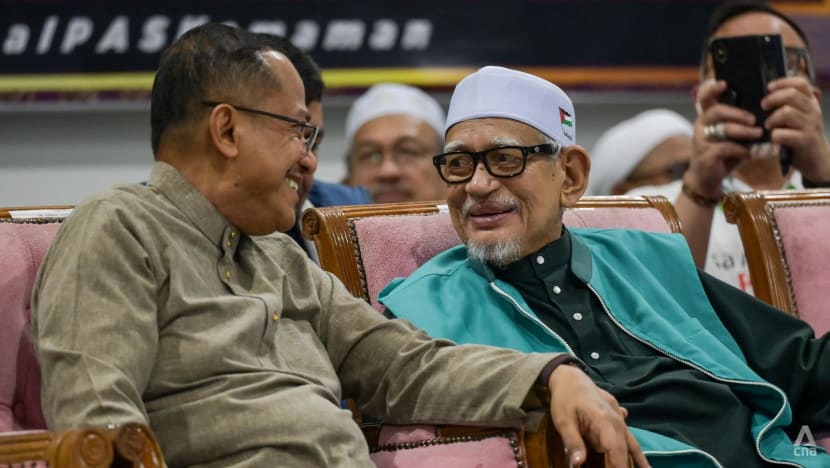
Parti Islam Se-Malaysia president Abdul Hadi Awang (right) with Terengganu chief minister Ahmad Samsuri Mokhtar. (Photo: CNA/Fadza Ishak)
During the course of the campaign, PN leaders touted him as a possible prime minister candidate for the country, as he does not have a hardline take on Islam and is a diplomatic leader.
Experts have pointed out that Dr Ahmad Samsuri’s attributes have made him a suitable leader for the party as it attempts to garner support from the non-Muslims ahead of the next elections.
He is also reportedly favoured by Mr Abdul Hadi.
Dr Ahmad Samsuri, who served as political secretary to Mr Abdul Hadi, was elected Terengganu chief minister in 2018 after winning in his election debut. He was picked over other PAS politicians who had served longer on the ground in Terengganu.
He appeared as a guest during an episode released on Mar 13 of the political and current affairs Keluar Sekejap podcast - hosted by former UMNO members Khairy Jamaluddin and Shahril Hamdan - in which he was asked why he was considered the “golden boy” in PAS, favoured by the party president.
During the podcast, Dr Ahmad Samsuri admitted to having been shocked by the nomination given that he had spent most of his working life based in Kuala Lumpur, not in Terengganu.
“To be honest, the (other PAS) members are ok, they have not distanced themselves from me,” said the PAS vice president, who is widely known by his moniker Dr Sam.
“Perhaps it (speaks to) the party’s level of discipline,” he added.
The party leaders are understood widely by observers to be divided across two factions - the ulamas, or religious clerics, and the progressive professionals.
Dr Ahmad Samsuri can be considered one of the main figureheads of the progressive professionals, a religiously moderate contingent, which includes other PAS members such as Kedah chief minister Muhammad Sanusi Md Noor.
Both Sanusi and Dr Ahmad gained political stock in PAS, following the party’s strong performance in last year’s state elections.
However, analysts pointed out that looking at PAS’ history, the party chiefs have always been individuals who are religious clerics, rather than professionals. This includes Mr Abdul Hadi’s predecessors Mr Fadzil Mohd Noor and Dr Yusuf Abdullah Rawa.
Assoc Prof Yusri told CNA that this works against the chances of someone like Dr Ahmad Samsuri taking the helm.
“If we consider leadership performance and suitability within the Malaysian context, perhaps Dr Sam is considered a suitable candidate.
"However, at the same time, Dr Sam does not come from a religious background; essentially, he is not an Islamic scholar. Yet PAS places great importance on the element of religious leadership in their legacy,” said Assoc Prof Yusri.
Political researcher James Chai echoed similar sentiments. The visiting fellow at ISEAS - Yusof Ishak Institute told CNA that in the context of PAS, it was important for whoever is president to command “religious respect among grassroots and also to maintain dominance over the spiritual adviser”.
“That means presidents have to be at least on par on religious knowledge with the spiritual adviser,” said Mr Chai.
Mr Chai noted that the spiritual adviser role in the party, known as the musyidul am, is a revered position and in the past the highest decision-maker in the party.
During the course of the campaign, PN leaders touted him as a possible prime minister candidate for the country, as he does not have a hardline take on Islam and is a diplomatic leader.
Experts have pointed out that Dr Ahmad Samsuri’s attributes have made him a suitable leader for the party as it attempts to garner support from the non-Muslims ahead of the next elections.
He is also reportedly favoured by Mr Abdul Hadi.
Dr Ahmad Samsuri, who served as political secretary to Mr Abdul Hadi, was elected Terengganu chief minister in 2018 after winning in his election debut. He was picked over other PAS politicians who had served longer on the ground in Terengganu.
He appeared as a guest during an episode released on Mar 13 of the political and current affairs Keluar Sekejap podcast - hosted by former UMNO members Khairy Jamaluddin and Shahril Hamdan - in which he was asked why he was considered the “golden boy” in PAS, favoured by the party president.
During the podcast, Dr Ahmad Samsuri admitted to having been shocked by the nomination given that he had spent most of his working life based in Kuala Lumpur, not in Terengganu.
“To be honest, the (other PAS) members are ok, they have not distanced themselves from me,” said the PAS vice president, who is widely known by his moniker Dr Sam.
“Perhaps it (speaks to) the party’s level of discipline,” he added.
The party leaders are understood widely by observers to be divided across two factions - the ulamas, or religious clerics, and the progressive professionals.
Dr Ahmad Samsuri can be considered one of the main figureheads of the progressive professionals, a religiously moderate contingent, which includes other PAS members such as Kedah chief minister Muhammad Sanusi Md Noor.
Both Sanusi and Dr Ahmad gained political stock in PAS, following the party’s strong performance in last year’s state elections.
However, analysts pointed out that looking at PAS’ history, the party chiefs have always been individuals who are religious clerics, rather than professionals. This includes Mr Abdul Hadi’s predecessors Mr Fadzil Mohd Noor and Dr Yusuf Abdullah Rawa.
Assoc Prof Yusri told CNA that this works against the chances of someone like Dr Ahmad Samsuri taking the helm.
“If we consider leadership performance and suitability within the Malaysian context, perhaps Dr Sam is considered a suitable candidate.
"However, at the same time, Dr Sam does not come from a religious background; essentially, he is not an Islamic scholar. Yet PAS places great importance on the element of religious leadership in their legacy,” said Assoc Prof Yusri.
Political researcher James Chai echoed similar sentiments. The visiting fellow at ISEAS - Yusof Ishak Institute told CNA that in the context of PAS, it was important for whoever is president to command “religious respect among grassroots and also to maintain dominance over the spiritual adviser”.
“That means presidents have to be at least on par on religious knowledge with the spiritual adviser,” said Mr Chai.
Mr Chai noted that the spiritual adviser role in the party, known as the musyidul am, is a revered position and in the past the highest decision-maker in the party.
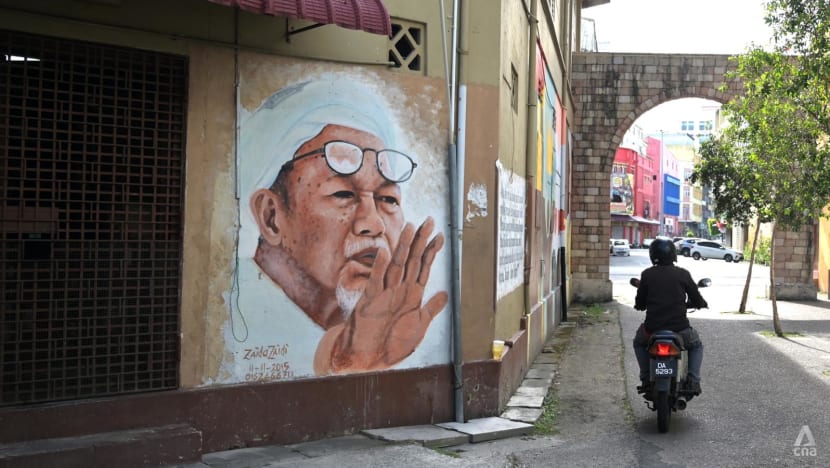
A mural of PAS former spiritual leader Nik Abdul Aziz Nik Mat in Kota Bharu, Kelantan. He has a lasting legacy in the party and is revered by many local Muslims and non-Muslims. (Photo: CNA/Zamzahuri Abas)
However, since the death of one of PAS' most influential spiritual leaders Nik Abdul Aziz in 2015, Mr Chai said that the balance of power within the party’s leadership has shifted to the presidency on account of how Mr Nik Abdul Aziz’s successors Mr Harun Din and Mr Hashim Jasin not being as influential and charismatic.
He added: “The need for a cleric to be PAS president certainly opens up the opportunity for Hadi’s son, Khalil, for higher positions but given his relative junior rank, he is unlikely to assume presidency unless an exceptional preference by Hadi.”
However, since the death of one of PAS' most influential spiritual leaders Nik Abdul Aziz in 2015, Mr Chai said that the balance of power within the party’s leadership has shifted to the presidency on account of how Mr Nik Abdul Aziz’s successors Mr Harun Din and Mr Hashim Jasin not being as influential and charismatic.
He added: “The need for a cleric to be PAS president certainly opens up the opportunity for Hadi’s son, Khalil, for higher positions but given his relative junior rank, he is unlikely to assume presidency unless an exceptional preference by Hadi.”
WILL INFIGHTING DISRUPT LEADERSHIP TRANSITION?
On the surface, PAS members CNA spoke to seem unwilling to stir up conflict and jostle for positions amid talk of a possible leadership transition.
PAS information chief Ahmad Fadhli Shaari told CNA that on the back of reports of Mr Abdul Hadi’s ill health, the process of leadership transition is ongoing within the party and that it would take place organically.
“There are no problems in PAS. When the time comes, the younger generation will take over (from) the older generation. That has been the practice in PAS for the longest time and there is no problem,” said the MP for Pasir Mas, a constituency in the northern state of Kelantan.
Mr Ahmad Fadhli claimed that unlike in other political parties where politicians jostle for leadership roles, PAS members are less keen to shoulder the huge burden of these positions.
“In PAS, the unique thing is people are not fighting for positions. We feel that positions are a responsibility that will be questioned in the hereafter. That is why we don’t jostle and backstab (for these positions). There is no squabbling and it is all harmonious. The question of renewal will occur naturally. Whoever leads the party will have to obey the party constitution,” he told CNA.
Meanwhile Dr Muhammad Khalil stressed that the party is constantly evolving in its strategy, approach and lineup of leaders. However, he maintained that the party’s principles have maintained a constant throughout its history.
“There is no party where the leader remains there forever, but the basic principles of the party are there and this is the strength of PAS. The basic principle of PAS is its stance on Islam and this has not shifted since the day the party was formed until today,” he said.
However, analysts CNA spoke to outlined that PAS’ history, like other political parties in the country, has been punctuated by infighting.
Mr Chai outlined how, for instance, the children of Mr Nik Abdul Aziz, have been “sidelined” since the former spiritual leader’s death. He cited how Mr Nik Abduh for example, was not fielded as a candidate in the last polls and that the former Bachok MP’s current senatorship “was given to maintain order within the party given Mr Nik Aziz’s remaining influence”.
Meanwhile Dr Norshahril outlined how in 2015, key leaders of the party’s progressive professional faction which included the likes of Mr Khalid Samad, Dr Dzulkefly Ahmad and Mr Mohamad Sabu left to form Parti Amanah Negara, a component party of the Pakatan Harapan coalition led by Mr Anwar.
He predicted that if Mr Abdul Hadi was to retire or pass away, it could trigger a new dynamic within PAS that could see the professional faction play a bigger role.
“So going forward, we could see a new development within PAS because there is no strong theological class after Nik Aziz died … Hadi is the last samurai from that 1980s PAS generation and after him, we might see a decline in the (influence of the clerics) and this could trigger a new dynamic within the party,” he added.
WILL PAS RENEW LEADERSHIP NOW OR ADOPT A WAIT-AND-SEE APPROACH?
A key pressing question is whether the party would actually engineer leadership changes now while Mr Abdul Hadi is still at the helm, or if it will adopt a less proactive approach as the party is in a position of strength.
Ilham Centre’s Assoc Prof Yusri told CNA that PAS should not follow in the footsteps of many senior political figures in Malaysia who “have found it difficult to step down” and suggested they commence the process for leadership transition as soon as possible.
“It is a testing period for PAS … even though there will be egos that need to be overcome, the party has strong ethos and discipline, and history shows us it is able to overcome differences between members,” he said.
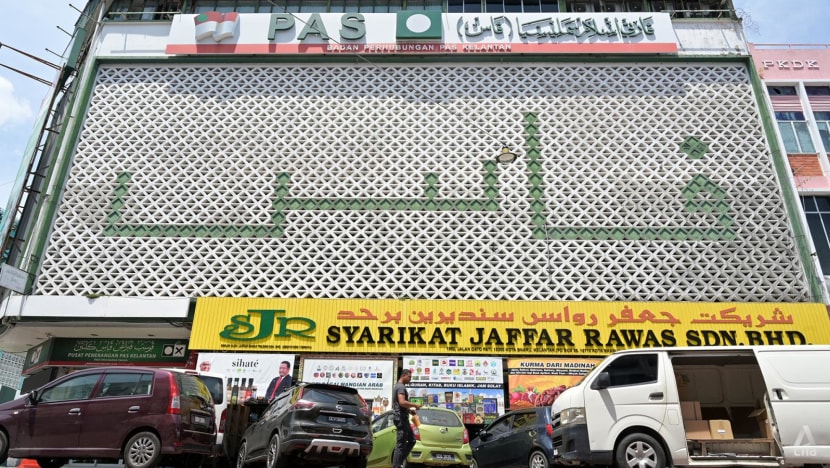
PAS party headquarters in Kelantan. (Photo: CNA/Zamzahuri Abas)
Yet, Mr Chai suggested that the party is likely to adopt a “wait and see attitude” as it did during the end of the tenure of its spiritual leaders Mr Nik Abdul Aziz and Mr Harun Din, both of whom died while holding the post.
“Adopting the alternate approach might trigger panic among party members and thus would be avoided,” he said.
“The succession will likely only take place after the death or retirement of Hadi. This will be relatively orderly as large-scale differences have been assuaged and PAS close ranks relatively quickly,” added Mr Chai.
Source: CNA/am(ao)
Yet, Mr Chai suggested that the party is likely to adopt a “wait and see attitude” as it did during the end of the tenure of its spiritual leaders Mr Nik Abdul Aziz and Mr Harun Din, both of whom died while holding the post.
“Adopting the alternate approach might trigger panic among party members and thus would be avoided,” he said.
“The succession will likely only take place after the death or retirement of Hadi. This will be relatively orderly as large-scale differences have been assuaged and PAS close ranks relatively quickly,” added Mr Chai.
Source: CNA/am(ao)
All Islamist Supremacist political parties the world over are led and controlled by Ayatollahs, Mullahs and Ulamas.
ReplyDeleteProfessionals are only brought in as Executives , not top leaders, for the purpose of Government Administration
Even the Ayatollahs realise that to cling on to power, they need people who are not only loyal to their Islamist Supremacist creed, but also understand the workings of the modern economy and finance.
How about all those demoNcratic administration all over the world?
DeletePseudo-professionals are only brought in as Executives & top leaders, for the purpose of fronting Government Administration. While the real puppeteers hide behind at the background to plan their goals.
Any different?